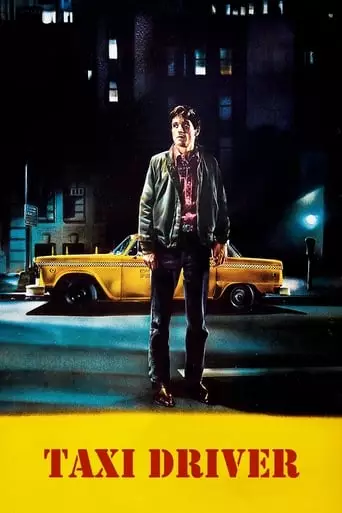
Taxi Driver (1976) Watch Online Free
A mentally unstable Vietnam War veteran works as a night-time taxi driver in New York City where the perceived decadence and sleaze feed his urge for violent action.
Taxi Driver (1976), directed by Martin Scorsese and written by Paul Schrader, is a haunting portrait of loneliness, alienation, and urban decay, encapsulated through the eyes of Travis Bickle, a mentally unstable Vietnam War veteran. Set against the gritty, neon-lit backdrop of New York City in the 1970s, Travis (played by Robert De Niro) takes up a night-shift taxi job to escape the chaos of his thoughts and the depravity he perceives around him. He becomes increasingly fixated on cleaning up the crime-ridden streets, targeting figures like a young prostitute, Iris (Jodie Foster), and the corrupt figures he sees as symbols of the city’s moral rot.
The film’s plot revolves around Travis’s descent into madness. As he grows more isolated, his worldview becomes more warped. He begins to see himself as a “savior,” believing he must rescue Iris from her life of prostitution, leading to a violent and explosive finale. The film blurs the line between heroism and madness, leaving viewers questioning Travis’s perception of reality. His journey is both a psychological breakdown and a violent attempt to reclaim control in a world that seems beyond repair.
The central themes of Taxi Driver include isolation, violence, and redemption. Travis’s mental decline is a reflection of his deep alienation from society. His internal struggles, amplified by the bleak environment of New York City, explore themes of moral decay and urban despair. The film critiques the social disintegration of the city in the 1970s, with New York portrayed as a chaotic, dangerous, and morally bankrupt environment. The personal and societal breakdowns intertwine, with Travis’s personal crisis mirroring the city’s larger struggles.
Another major theme is the concept of the “lonely man”—a recurring motif in Schrader’s works. Travis is not just a solitary figure; he’s a man who cannot find a connection, and his inability to do so leads to violent tendencies. The film touches on the impact of war on individuals, as Travis’s time in Vietnam and his subsequent reentry into society seem to warp his sense of identity and purpose.
The portrayal of violence in Taxi Driver is stark and visceral. Scorsese, working on a low budget, was able to film on-location in the streets of New York, capturing the gritty reality of the city, which heightens the film’s realism. The violence, though shocking, is not gratuitous but serves as a crucial turning point in Travis’s psychological unraveling. It serves as a catharsis for Travis but also a terrifying commentary on the unpredictable nature of human behavior when pushed to the brink.
After watching Taxi Driver, you are likely to feel a combination of unease, reflection, and perhaps a lingering sense of despair. The film immerses you in Travis’s disturbed state of mind, and his descent into violence and obsession might leave you unsettled. At the same time, Scorsese’s brilliant filmmaking, De Niro’s performance, and the thought-provoking themes will likely provoke deep reflection about human nature, societal decay, and the fine line between sanity and madness. You might find yourself pondering the city’s alienation and wondering about the characters’ fate, particularly Travis’s.
Ultimately, Taxi Driver is a powerful, disturbing cinematic experience that leaves an emotional mark. Whether you feel disturbed, empathetic, or conflicted, the film is undeniably a masterpiece of modern cinema, challenging viewers to confront the darker aspects of society and the human psyche.
